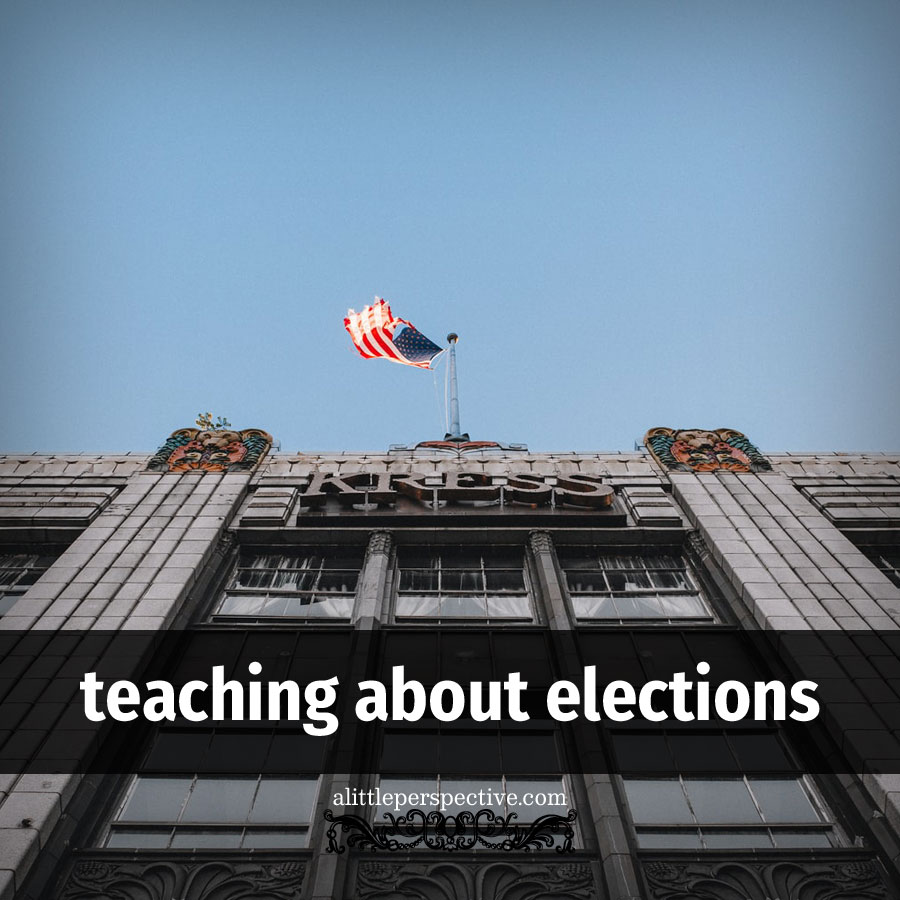
If I were still homeschooling my children today, I would use these living books to introduce elections and American politics to my children.
Grades 1-3
What’s the Big Deal About Elections? by Ruby Shamir
If I Ran for President by Catherine Stier
The Night Before Election Day by Natasha Wing
These books teach the mechanics, the event, of an American election and the citizen’s role in selecting our government representatives through voting.
Grades 4-6
For Which We Stand: How our Government Works and Why It Matters by Jeff Foster
The Constitution Decoded by Katie Kennedy
We Elect a President: The Story of Our Electoral College by Tara Ross
Each one of these books goes into greater depth on the event of an American election, and our representative form of government, in different ways. For Which We Stand is a civics primer. The Constitution Decoded introduces the text of the Constitution and what it means (not what it should mean, an important distinction). We Elect a President introduces the wisdom of the Founders in establishing the Electoral College, for children.
Technically off topic but vital for this age:
The Story of the Thirteen Colonies by Christine Miller
The Story of the Great Republic by Christine Miller
Grades 7-9
Mr. Beat presents…The Ultimate American Presidential Election Book: Every Presidential Election in American History (1788-2016) by Matt Beat
This is a history of presidential elections from the very first one. A thorough knowledge of where we have been short circuits so many disastrous mistakes in the future.
The Founding Documents: The Declaration of Independence and The Constitution
It is vital for every citizen to read and understand these short documents for themselves. If you can read the Bible, you can read these and understand them. And if your teens get stuck going through them themselves, use The Constitution Decoded to help.
The Mainspring of Human Progress by Henry Grady Weaver
Thus is not a book about elections. Rather it is a book about the history of human liberty and America’s role in that history. A reverence for human liberty, which is based on the commandments of Torah after all (as the author explains), is vital to inculcate in our children as they grow into adulthood.
Technically off topic but vital for this age:
The Story of Liberty by Charles Coffin
Sweet Land of Liberty by Charles Coffin
Grades 10-12
What’s So Great About America by Dinesh D’Souza
American exceptionalism. Our country is a shining city on a hill, as far as human government goes. Why? Acclaimed historian Dinesh D’Souza reminds us with his unique perspective as an immigrant.
Enlightened Democracy: The Case for the Electoral College by Tara Ross
The Founder’s wisdom for adults. Since the clamoring is loud right now to abolish the Electoral College, this book is vital knowledge for every US citizen and voter.
One Vote Away: How a Single Supreme Court Seat Can Change History by Ted Cruz
Why include this book? It is a history of pivotal Supreme Court decisions, and that is the surface vehicle expounding a foundational truth: EVERY VOTE MATTERS. ONE VOTE – YOUR VOTE – MATTERS.
Technically off topic but vital for this age:
Uncle Eric’s How the World Works series by Richard J. Maybury
Now, after presenting a list like this, let me just reassure you, homeschooling mom. YOU DO NOT NEED A TEACHER’S GUIDE TO TEACH THESE BOOKS. Here’s what you do.
When your children are in Grades 1-3, read the books listed aloud to them, preferably with as many children on your lap or snugged next to you on the couch as you can manage, and answer questions. When they are reading on their own, let them practice on these books.
When your children are in Grades 4-6, read the books listed aloud to them as a family. Discuss, and answer questions. Include sections for copywork and dictation material. What sections? Whatever sections touched your heart or enlightened your mind. It really is that simple.
When your children are in Grades 7-9, read the books listed aloud to them as a family. Discuss, and answer questions. Formulate together a single topic sentence to describe and explain each book. They should write, from that single sentence, a single paragraph or single page summarizing the topic and its supporting points. Do this as a team in 7th grade; by 9th grade they should be able to do this on their own.
When your children are in Grades 10-12, read the books listed aloud as a family. Discuss. Go on bunny trails. Do more independent research in an area brought up in the reading. Go to the bibliography and dig into sources. Write a paper presenting a clarification or auxiliary point gleaned from the book. Do this as a team in 10th grade. By 12th grade they should be able to do this on their own.
If a child graduates having done the above, he will have learned more than most college graduates, who, through the use of textbooks and professor indoctrination, leave university cognitively rigid instead of proficient in the power of their mind.
















Wow, Christine. Thank you so much for these incredible recommendations. I have written all down to start asap with my teens. I’m super excited about the ones you included on human liberty…. that’s what I’ve been trying to relay to my children and needed a trusted source. I love your Bible plan and especially your notes.
Thank you for your diligence and love for learning and teaching.
You are so very welcome Teresa! Thank you for stopping by and leaving your kind comment. Please do come back again.